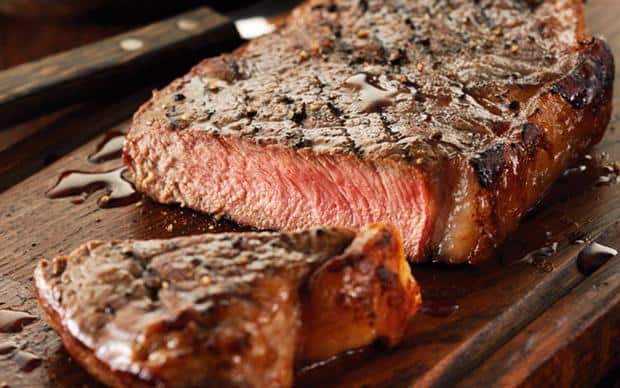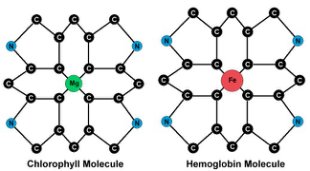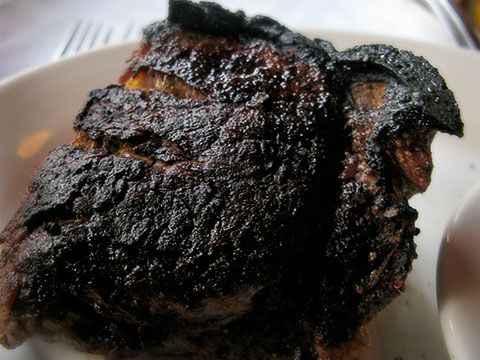“Harvard School of Public Health released study results showing that red meat consumption was associated with a higher risk of early death”
“Scientists have demonstrated a connection between eating large amounts of red meat and an individual’s risk for heart disease”
“High consumption of red and processed meats substantially increased the risk of colorectal cancer.”
“Three extra servings of red meat every week increases the risk of developing diabetes by 50 percent”
“Red Meat Consumption Linked to Increased Risk of Total, Cardiovascular, and Cancer Mortality”
Introduction
Like many people, I do enjoy eating a good steak. However, reading media headlines like those above (taken from various articles and news sites) can be troubling. Does red meat really destroy my health? Does it really give me cardiovascular problems, diabetes and cancer?

Disclaimer: I do not own any stock in beef producing companies! Hence, I have no financial stake in the answer being yes or no. What I do want to achieve is for Genesis Gym’s personal training clients to get the best results in the healthiest way. After all, our tagline is “Smart Fitness, Total Health”.
So let’s approach this subject with an open mind and see where the truth lies. If avoiding red meat is the healthiest thing to do, then we shall do that. But if not, then perhaps we can find a way to eat red meat while negating its negative consequences. In this post we will look at the results of two reports. On the surface they look pretty terrible for red meat and processed meat consumption. But are they really?
What does the first report say?
“Red Meat Consumption Linked to Increased Risk of Total, Cardiovascular, and Cancer Mortality”.
That does sound pretty terrible but we need to look deeper into what the study actually says. We need to separate truth from sensationalized headlines designed to sell newspapers or get website clicks.
Part of my job is to delve deeper into these studies and break down the results into simple, healthy habits that I can teach to our personal training clients. Please stay with me as we look at the headlines versus what truth is in them.
Headline: “Red Meat Consumption blamed for one in ten early deaths”
Truth: This is an observation study – there is no valid proof of anything.
These kinds of studies can only create “new theories” but cannot be used as proof by themselves. They are too open to flaws and other factors influencing the results.
Observations can be used wrongly. See the following examples:
- “100% of people breathe air. 100% of people die, therefore there is a high risk of dying due to breathing.”
- “Firemen are present at 100% of major fires, therefore removing all firemen would stop major fires.”
The observation in no way proves the conclusions, and anyone can see that these statements do not make any sense. To get useful data, we would need to isolate red meat consumption as the single difference in the study, but there is no real way to do that. In addition, we would need to differentiate between different kinds of red meat. Is a piece of grass fed steak really the same as a processed hamburger patty?
Headline: “Unprocessed red meat consumption also leads to increased risk of death”
Truth: Hamburger patties were also included in the unprocessed meat category
Hamburger patties are some of the most commonly eaten forms of red meat. They look like meat, taste like meat, but in my opinion, they should not be considered unprocessed. After all, a Porsche and a Tata Nano are both cars. But they are not likely to be mistaken for one another.

Go to your supermarket and take a look at the ingredients on most pre-packed hamburger patties. You think you are getting plain old meat in a circular shape. But actually you are getting…
- Textured Vegetable Protein: Usually genetically modified soy flour – Probably hormone disrupting. It’s also heated to 200 degrees C – denaturing the protein and making it much less useful to our bodies.
- MSG: A taste enhancer, which can be “over-exciting” to the brain if a person is sensitive to it, possibly damaging nerve cells. There are also people who are intolerant of MSG. I am one of them. I get itchy ears and a blocked nose when I consume too much MSG – common signs of a food intolerance. Finally MSG makes food super yummy and tends to make people overeat.
- Flour and other fillers: Sometimes meat isn’t even the first ingredient in the list.
- Hamburger patties also come with You guessed it, hamburger buns and french fries. How many people do you know who take away the buns and fries from a meal? Besides some dedicated health-conscious people, not many. Is it the meat that’s causing the problems, or the bad oils and processed flour?
Headline: “The study was long term, tracking people from 1980 to 2006”
Truth: People can’t remember what they ate
Study participants were interviewed every 4 years from 1980 to 2006. To design our personal training nutrition plans, we ask clients what they eat over a typical week. As you can imagine, it’s quite difficult for many people to remember. If they can’t remember what they ate over the last 7 days, what sort of errors could arise trying to remember the last 4 years?
Headline: “The top 20 percent of red meat eaters ate excess red meat”
Truth: They also did alot of other stuff “in excess”
The same people who were in the top 20 percent of red meat eaters also had the following lifestyle habits:
- Less physical activity
- More smoking (up to 3x more in many cases)
- Less consumption of multi-vitamins
- Increased alcohol consumption
- Increased obesity
This list makes it almost impossible to say which of the above factors was the one contributing most to the early death of people who ate red meat in “excess”. But we do need to be aware that “Red meat kills you” is a much stronger headline than “Lack of exercise is harmful”.
What about the second report?
In another report, the World Health Organization (WHO) recently labeled processed meats as a “Group 1” known carcinogen (something that causes cancer). Red meat was labeled “Group 2a” which is a probable carcinogen.
Processed meat was defined as anything salted, fermented, smoked, or anything processed to increase flavor or improve preservation.
Red meat was anything that was red when raw. The red color is caused by red blood cells in the meat. Beef, pork, lamb, animal organs, blood products etc are considered red. While chicken, fish and seafood are not considered red.
These groupings are not as damning as they sound at first. Because there is another Group 1 carcinogen which all of us are exposed to everyday, especially in a place like Singapore. That’s right. Sunlight is a Group 1 carcinogen.
This means it is not just about black and white, good and bad. The correct question is “how should we get the right amount and type”, rather than avoiding something altogether.
Like sunlight, red meat has health benefits as well. It contains creatine for muscle function. It has carnitine to burn fat at the cellular level. It also has B vitamins which are important for your immune system as well as an important process called methylation.
For men and women who would like to build more muscle, there is an additional benefit. Beef appears to be the meat that is closest to human muscle in terms of the kinds of amino acids it contains. This may be a reason why strong people have favored beef as a protein for centuries.
What did the study really find?
This WHO report is a population study. These are observation studies, using food recall interviews. And we have seen the flaws of this type of study earlier in this post.
To be fair, this is probably the only practical form of study. Would it really be possible to find thousands of people willing to be locked in a room and forced to eat sausages and hamburgers for five years?
What the study found was that those who recalled eating more processed meats had a higher risk on one type of cancer only.
Colorectal cancer.
I have had an uncle who passed away from this type of cancer and it is known as a dangerous form. This is definitely a problem. What it does show is that the problems are confined to one particular area of our body – the digestive system.
With all this background information, I would like to share the 5 rules for meat consumption that we share with our personal training clients at Genesis Gym.
Rule #1 – Eat Veggies
Red meat may cause cancer through the way our bodies process the red blood cells of the meat. When these are digested, they can turn into “N-nitroso-compounds” (NOC) which can damage the insides of your intestines.
When our bodies get damaged, they need to repair quickly with new cells. Extra cell creation means more DNA damage and more cancer risk.
Luckily, green vegetables can be a way to stop this damage. Chlorophyll, which gives veggies their green color, looks almost identical to red blood cells. See the picture below, the only difference is that you replace the Fe (iron) molecule with Mg (magnesium).
When you eat lots of green vegetables, you get lots of cholorophyll and can’t absorb as much red blood cells. Less red blood cells processed, less NOC, and less cancer risk.

A good target for ladies is 4 fist-size servings of green vegetables per day. And for men, it is 6 servings. If you love red meat alot, then even more veggies would be a good idea. Enjoy a pound of veggies to safely enjoy a pound of steak.
Rule #2 – Eat Unprocessed Meat
Processed meats tend to have higher levels of nitrates, which help to preserve the meat. During digestion, nitrates convert to NOC and nitrites. These end products are directly toxic.
If you are going to eat red meat, choose unprocessed meat, preferably grass-fed. A grass-fed steak is not the same to your body as a commercially mass-produced cocktail sausage.
Rule #3 – Don’t Burn Meat
When you overcook meat till it chars, the risk of digestive tract damage can increase. Because the charred bits contain chemicals called heterocyclic amines (HCAs). HCAs damage the DNA of your cells and increase cancer risk.

Rule #4 – Love Your Gut Bacteria
Carnitine is a critical nutrient for cell energy. A lack of carnitine results in low energy and premature cell death. But if you eat lots of red meat, excessive carnitine can be converted by your gut bacteria into whats called Trimethylamine N-oxide (TMAO). TMAO has quite strong links to colorectal cancer.
Making sure that you have the right types and amounts of gut bacteria can prevent this conversion. Make the conditions in your gut right for good bacteria. Some things you can do are:
- Reduce sugar intake
- Get rid of processed fats
- Add soluble fiber – we suggest potato starch in cold water
- Add probiotics – especially if you have recently been on antibiotics
Rule #5 – Make Sure Your Multivitamin Does Not Contain Iron
If you regularly eat red meat, you are very unlikely to have an iron deficiency. Excess iron can be a problem. Just like metals left outdoors rust, so does excess iron in the body. This rust (oxidation) is damaging to cells and DNA.
For “completeness”, many multivitamins contain iron. For red meat eaters, this can be excessive. The only people who would need iron in their multivitamin are:
- Vegetarians
- Vegans
- Ladies who don’t eat red meat and are still mensturating
- People who are medically diagnosed with anaemia
For the rest of us, choosing a multivitamin without iron is probably a good choice.
Summary
I love scientific studies, but they have their limitations. By understanding how our bodies work, we can eat red meat and get all its benefits, while avoiding its negative effects. A grass-fed steak with a side salad is likely to give far more benefits than risks. But an overcooked, charred sausage with a side of chips deep fried in vegetable oil is probably going to give far more risks that benefits.
I hope this article will help you think about red meat in a scientific, yet holistic way. If you want a deeper understanding of how to implement a nutrition plan for yourself, then we welcome you to join one of our personal training programmes by clicking the button below.
The Genesis Gym personal trainers will design the nutrition, lifestyle and fitness plan for you and guide you to your fitness goals.
To you happiness, strength and health,
Coach Jonathan Wong
Director,
Genesis Gym Singapore
-Smart Fitness, Total Health
